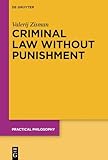Criminal Law Without Punishment : How Our Society Might Benefit From Abolishing Punitive Sanctions / Valerij Zisman.
Material type: TextSeries: Practical Philosophy ; 25Publisher: Berlin ; Boston : De Gruyter, [2023]Copyright date: ©2023Description: 1 online resource (IX, 233 p.)Content type:
TextSeries: Practical Philosophy ; 25Publisher: Berlin ; Boston : De Gruyter, [2023]Copyright date: ©2023Description: 1 online resource (IX, 233 p.)Content type: - 9783111027753
- 9783111028026
- 9783111027821
- 364.601 23
- K5103 .Z57 2023
- online - DeGruyter
- Issued also in print.
| Item type | Current library | Call number | URL | Status | Notes | Barcode | |
|---|---|---|---|---|---|---|---|
 eBook
eBook
|
Biblioteca "Angelicum" Pont. Univ. S.Tommaso d'Aquino Nuvola online | online - DeGruyter (Browse shelf(Opens below)) | Online access | Not for loan (Accesso limitato) | Accesso per gli utenti autorizzati / Access for authorized users | (dgr)9783111027821 |
Frontmatter -- Acknowledgment -- Contents -- Part I: The Problem of Punishment -- Chapter 1 Another “New Perspective”? -- Chapter 2 Definitions, Theses, and Method -- Part II: Backward-Looking Approaches -- Introduction -- Chapter 3 Brute Retributivism -- Chapter 4 Fairness -- Chapter 5 Penance and Censure -- Chapter 6 Victims’ Rights -- Part III: Forward-Looking Approaches -- Chapter 7 Deterrence -- Part IV: Towards a Pluralistic Theory of Corrective Justice -- Chapter 8 Weaving the Patchwork Rug -- Chapter 9 Objections to Corrective Approaches to Criminal Law -- Chapter 10 Epilogue -- References -- Index of Names -- Index of Subjects
restricted access online access with authorization star
http://purl.org/coar/access_right/c_16ec
How can criminal punishment be morally justified? Zisman addresses this classical question in legal philosophy. He provides two maybe surprising answers to the question. First, as for a methodological claim, it argues that this question cannot be answered by philosophers and legal scholars alone. Rather, we need to take into account research from social psychology, economy, anthropology, and so on in order to properly analyze the arguments in defense of criminal punishment. Second, the book argues that when such research is properly accounted for, none of the current attempts to justify criminal punishment succeed. But that does not imply that the state should do nothing about criminal wrongdoing. Rather, the arguments that were supposed to justify criminal punishment actually speak in favor of an alternative approach to criminal law: restitution to the victim and restorative justice. That is to say, the state should coerce offenders to provide restitution for the harm inflicted on victims, and whenever possible restorative approaches should be taken to address criminal wrongdoing.
Issued also in print.
Mode of access: Internet via World Wide Web.
In English.
Description based on online resource; title from PDF title page (publisher's Web site, viewed 02. Jun 2024)


